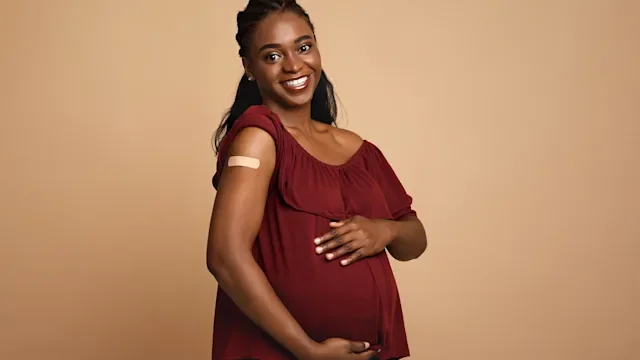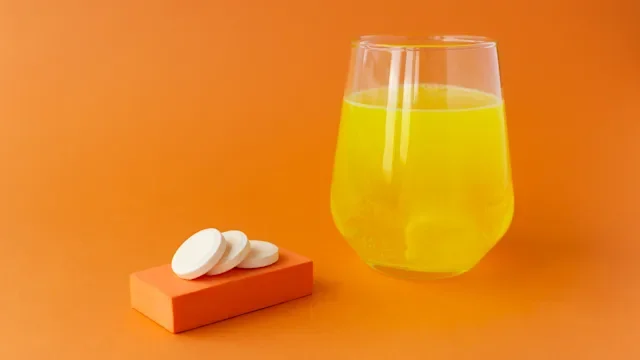The amount of blood in your body increases by up to 50% when you’re pregnant. This helps ensure that enough blood and nutrients can reach your growing baby. One nutrient that’s especially important during pregnancy is iron. Getting too little iron during pregnancy can lead to iron-deficiency anemia (low red blood cell levels). This can put your baby at risk of preterm delivery and low birth weight.
For this reason, iron is typically included in most prenatal vitamins. But should you take an additional iron supplement during pregnancy? Here’s what you should know.
How much iron do you need during pregnancy?
Iron is an essential mineral for everyone. It helps your body make hemoglobin (a protein in your red blood cells). Hemoglobin helps your blood carry oxygen from the lungs to the rest of the body. Iron also helps your body make myoglobin, a protein that helps deliver oxygen to your muscles.
Search and compare options
During pregnancy, you need more iron than usual. Adult women who aren’t pregnant need 18 mg of iron daily. But pregnant women need 27 mg daily.
There are three main reasons you need more iron during pregnancy:
You have a larger amount of blood in your body during pregnancy. More blood means more red blood cells. And red blood cells need iron to do their job.
Your baby needs iron. During pregnancy, you have a growing baby that also has iron needs. In fact, your baby will store iron to use in the first six months after birth.
The placenta has iron needs, too. The placenta is an organ that develops during pregnancy. During pregnancy, the placenta stores iron to protect the baby in case the mother has a low iron supply.
Do you need an iron supplement during pregnancy?
Not necessarily. It’s generally recommended that all pregnant women in the U.S. eat an iron-rich diet and take a daily prenatal vitamin with iron. But if your prenatal vitamin doesn’t contain iron, or if your iron levels are low, you may need an additional iron supplement.
But experts don’t always agree on the specifics of supplementing iron during pregnancy. A few organizations have differing views:
American College of Obstetricians and Gynecologists (ACOG): ACOG recommends taking a prenatal vitamin with iron during pregnancy. Along with a healthy diet, this may be enough to meet your iron needs. ACOG doesn’t specify how much iron should be in your prenatal vitamin.
World Health Organization (WHO): WHO recommends a daily iron supplement of 30 mg to 60 mg. This could be part of your prenatal vitamin or through a separate iron supplement.
U.S. Preventive Services Task Force (USPSTF): USPSTF states there’s not enough research to recommend iron supplements for all pregnant women. They believe that studies are conflicting on whether all pregnant women — including those with normal iron levels — need additional iron.
Reasons to schedule prenatal care: Even if you’re perfectly healthy, there are many reasons why seeing a healthcare professional regularly throughout your pregnancy is a good idea.
Omega-3 supplements during pregnancy: Here’s what the experts say about getting enough omega-3 fatty acids while you’re pregnant.
Prenatal vitamins: Why are they so important? Learn more about the role of prenatal vitamins to support a healthy pregnancy.
Despite a lack of clear guidelines, your prenatal care team will likely recommend a daily prenatal vitamin with iron and an iron-rich diet. They’ll also likely run blood tests to check your iron levels during pregnancy. If you’re at risk for iron-deficiency anemia, they may recommend adding an iron supplement in addition to your prenatal vitamin with iron.
You shouldn’t take extra iron on your own or double up on your prenatal vitamin to try and raise your iron levels. Too much iron can be harmful (more on that later). If you have concerns about your iron levels during pregnancy, reach out to your prenatal care team for guidance.
Best food sources of iron during pregnancy
Iron comes in two forms: heme iron and non-heme iron. Heme iron is more easily absorbed by the body. It’s found in animal sources, such as meat, seafood, and poultry.
Plant-based foods and iron-fortified foods have non-heme iron, which is harder for your body to absorb. But adding foods with vitamin C (such as citrus fruits, tomatoes, and broccoli) to your diet can help you absorb non-heme iron.
Some animal sources with the highest amount of iron include:
Oysters: 8 mg in 3 oz
Beef: 2 mg in 3 oz
Canned sardines: 2 mg in 3 oz
Chicken: 1 mg in 3 oz
Some of the best plant-based sources of iron include:
Fortified whole wheat cereal: 18 mg in ¾ cup
Canned white beans: 8 mg in 1 cup
Boiled spinach: 3 mg in ½ cup
Tofu: 3 mg in ½ cup
Eating a balanced diet can help ensure you get enough iron. Many foods, such as bread and cereals, have iron added to them to help ensure it’s part of your daily diet. Checking your food labels and keeping a daily food journal can help you track how much iron you’re consuming.
Best iron supplements during pregnancy
If your prenatal care team recommends an iron supplement, there are many types of over-the-counter (OTC) supplements to choose from. Examples include:
Ferrous gluconate
Ferrous fumarate
Ferrous bisglycinate
Ferric citrate
Iron supplements are similarly effective. But you may prefer one product over another for various reasons. For example, ferrous bisglycinate has been found to have fewer side effects than ferrous fumarate. Or maybe you prefer a supplement that’s vegan or one that comes in a liquid or chewable form. Cost may also be a factor.
Regardless of which supplement you choose, pay attention to the amount of “elemental iron” in the product when it comes to the dosage. Elemental iron refers to the amount of iron your body can absorb. It’s usually the smaller number on the iron product’s label. For example, a ferrous sulfate 325 mg tablet contains 65 mg of elemental iron.
It’s best to take an iron supplement on an empty stomach. And you may also need to separate it from your other medications. Your prenatal care team can help you find the right form and dosage of iron for your needs. As mentioned, don’t take an iron supplement on your own without the guidance of a healthcare professional.
Do iron supplements interact with any medications?
Yes, iron supplements can interact with certain medications as well as certain foods. You should avoid taking an iron supplement within 2 hours of thyroid hormone medications, some antibiotics, and certain heartburn medications. You should also avoid dairy products and coffee or tea within 2 hours of taking iron — they can prevent your body from absorbing it properly. Orange juice is a better option, as it can help with iron absorption.
Why is low iron in pregnancy dangerous?
Low iron levels can have negative effects for the mother if left untreated, such as:
Higher risk of infection
Heart problems, including arrhythmias or heart failure
Your growing baby may also have complications as a result of not getting enough iron. Some studies have shown that babies who don’t get enough iron are more likely to be born premature or at a low birth weight.
What are symptoms of low iron during pregnancy?
You may not always feel symptoms of low iron levels, especially at first. But once anemia develops, you may notice symptoms including:
Shortness of breath
Tiredness
Weakness
Hair loss
Leg cramping
Some symptoms of low iron can mimic symptoms of pregnancy itself. However, if you have any ongoing symptoms of iron-deficiency anemia, talk to your prenatal care team.
Is there such a thing as too much iron in pregnancy?
Yes, too much iron can be harmful. So you shouldn’t take extra iron during pregnancy without guidance from a healthcare professional.
In general, excess iron intake can cause stomach issues, including vomiting and ulcers. Very high doses can lead to organ failure and even death in severe cases. Specifically during pregnancy, excess iron may raise the risk of eclampsia in the mother. It may also lead to growth and development problems for the infant, both before and after birth.
Frequently asked questions
A metallic taste in your mouth during pregnancy may have several causes. Hormonal changes can lead to a metallic taste for some people, especially during the first trimester. Iron in your prenatal vitamin or iron supplement may also cause a metallic taste for some people.
Yes, iron infusions are a safe option to raise iron levels during pregnancy. But they’re typically not a first-choice option. Iron infusions are often used if oral iron supplements aren’t effective or cause excessive side effects. Your prenatal care team will let you know if an iron infusion is needed due to low iron levels during your pregnancy.
A metallic taste in your mouth during pregnancy may have several causes. Hormonal changes can lead to a metallic taste for some people, especially during the first trimester. Iron in your prenatal vitamin or iron supplement may also cause a metallic taste for some people.
Yes, iron infusions are a safe option to raise iron levels during pregnancy. But they’re typically not a first-choice option. Iron infusions are often used if oral iron supplements aren’t effective or cause excessive side effects. Your prenatal care team will let you know if an iron infusion is needed due to low iron levels during your pregnancy.
The bottom line
Your body requires more iron than usual during pregnancy. An iron-rich diet and a prenatal vitamin with iron are usually enough to meet your needs. But if your iron levels remain low, your prenatal team may recommend an additional iron supplement.
You shouldn’t take an iron supplement on your own, as excess iron can be harmful to you and your baby. Your healthcare team can help you find the right form and dosage of iron for you if needed.

Why trust our experts?



References
Abu-Ouf, N. M., et al. (2015). The impact of maternal iron deficiency and iron deficiency anemia on child’s health. Saudi Medical Journal.
American College of Obstetricians and Gynecologists. (2023). Nutrition during pregnancy.
American College of Obstetricians and Gynecologists. (2024). Routine tests during pregnancy.
American Pregnancy Association. (n.d.). Anemia during pregnancy.
American Pregnancy Association. (n.d.). Dysgeusia symptoms and remedies.
American Pregnancy Association. (n.d.). How to treat iron deficiency during pregnancy.
Benson, A. E., et al. (2022). The incidence, complications and treatment of iron deficiency in pregnancy. European Journal of Haematology.
Bumrungpert, A., et al. (2022). Efficacy and safety of ferrous bisglycinate and folinic acid in the control of iron deficiency in pregnant women: A randomized, controlled trial. Nutrients.
Burke, R. M., et al. (2014). Identification, prevention and treatment of iron deficiency during the first 1000 days. Nutrients.
Burton, G. J., et al. (2015). The placenta: A multifaceted, transient organ. Philosophical Transactions of the Royal Society B.
Detlefs, S. E., et al. (2022). The impact of response to iron therapy on maternal and neonatal outcomes among pregnant women with anemia. American Journal of Obstetrics & Gynecology.
Georgieff, M. K., et al. (2019). The benefits and risks of iron supplementation in pregnancy and childhood. Annual Review of Nutrition.
Georgieff, M. K., et al. (2023). The importance of iron deficiency in pregnancy on fetal, neonatal, and infant neurodevelopmental outcomes. International Journal of Obstetrics & Gynecology.
Georgieff, M. K. (2020). Iron deficiency in pregnancy. American Journal of Obstetrics & Gynecology.
Hwang, J., et al. (2013). Maternal iron intake at mid-pregnancy is associated with reduced fetal growth: Results from Mothers and Children’s Environmental Health (MOCEH) study. Nutrition Journal.
MedlinePlus. (2024). Eclampsia.
MedlinePlus. (2024). Iron.
Office of Dietary Supplements. (2023). Iron. National Institutes of Health.
Quezada-Pinedo, H. G., et al. (2021). Maternal iron status in pregnancy and child health outcomes after birth: A systematic review and meta-analysis. Nutrients.
Richmond Pharmaceuticals. (2024). Ferrous sulfate tablet [package insert]. DailyMed.
U.S. Preventive Services Task Force. (2024). Iron deficiency and iron deficiency anemia during pregnancy: Screening and supplementation.
World Health Organization. (2024). Daily iron and folic acid supplementation during pregnancy.














